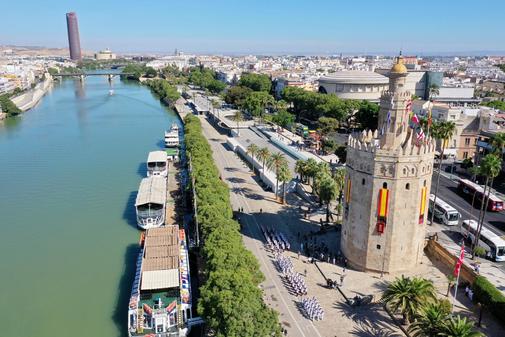- Culture. 500 years of the expedition of Elcano and Magallanes, a sailor in ruin and another condemned to ostracism
- History: That would be the deed of Elcano five centuries later
There were no large thermometers in 1519 that reminded the walker that it is not a good idea to be outdoors in the central hours of the day on the eve of the dreaded Sevillian ferragosto. But the temperatures should not be very different from those reached this Saturday on the banks of the Guadalquivir. 36 degrees in the shade according to official records (could have been worse). On August 10, 500 years ago, 239 sailors commanded from Seville, Fernando de Magallanes , seeking to open a new route to the Moluccan Islands, the paradise of spices, which at that time were a highly valued asset. And three years later, as soon as 18 returned, under very precarious conditions, under the command of a Basque, Juan Sebastián Elcano - who replaced the first in charge of the expedition when Magallanes died in an attack suffered in the Philippines -, thus completing the first round the world of history
Seville inaugurated this Saturday what is announced as a triennium of celebrations that aims to claim before the world that historical deed. Carmen Calvo, vice president of the acting Government, and two of her ministers, those of Culture and Finance (the three Andalusians), were present to give institutional relevance to some commemorative events that, for now, are far from being at the height of the milestone They pretend to exalt. It is enough to compare them with the commitment made by the Government of Spain in 1992, in the same city of Seville, on the occasion of the V centenary of the discovery of America .
This Saturday, the events began with an offering of flowers and a parade in homage to the fallen military, next to the Monument to the Mariners, and the later inauguration of an interpretation center on the first circumnavigation.
Other exhibitions will also serve to show and disseminate the value of the feat, including the main one, which will take place in the Archive of the Indies under the title of The Longest Journey , which will open on September 12. In addition, the Naval Museum of Madrid plans to open the exhibition We were the first , to highlight the high significance for navigation, international trade and geographical studies of that expedition that allowed us to draw the earth for the first time as a sphere and is analyzed today as the first milestone of globalization.
On paper, one of the great bets that the city had made for this event with its history has remained: the recovery of the old atarazanas (the historic shipyards of the Arenal neighborhood), which remains a dream after decades of Clumsy management by those who have failed to take advantage of the enormous potential of the commemoration for its restoration and its relaunch as a space for culture and history.
During the events held this Saturday, attended by the Andalusian Government in full and the Admiral Chief of the General Staff of the Navy, Teodoro López Calderón, the Vice President of the Government highlighted the "universal" nature of the trip to Magallanes and Elcano, because « shortly after we look at it with dignified eyes, we will observe that the expedition came under the command of a Portuguese and returned to the command of a Spaniard », also underlining the heterogeneity of a crew of varied origin.
In the inevitable parallel with Spain today, Carmen Calvo introduced the gender perspective (also inevitable) encouraging to recover the values of those adventurers in a society that knows that "of those magallanes and elcanos that we are looking for, half are women . "
According to the criteria of The Trust Project
Know more- Seville
- Carmen Calvo
- Spain
- America
- history
- Tourism and ports
- Andalusia
- Juan Manuel Moreno Bonilla
In a shirt of eleven rods Juanma Moreno: "I have discovered more sticks than the erotic power"
SevillaSeville commemorates that it was the origin and arrival of the first round the world
PoliticsAndalucía, "island of stability" in the "ocean of uncertainty" caused by Pedro Sánchez

